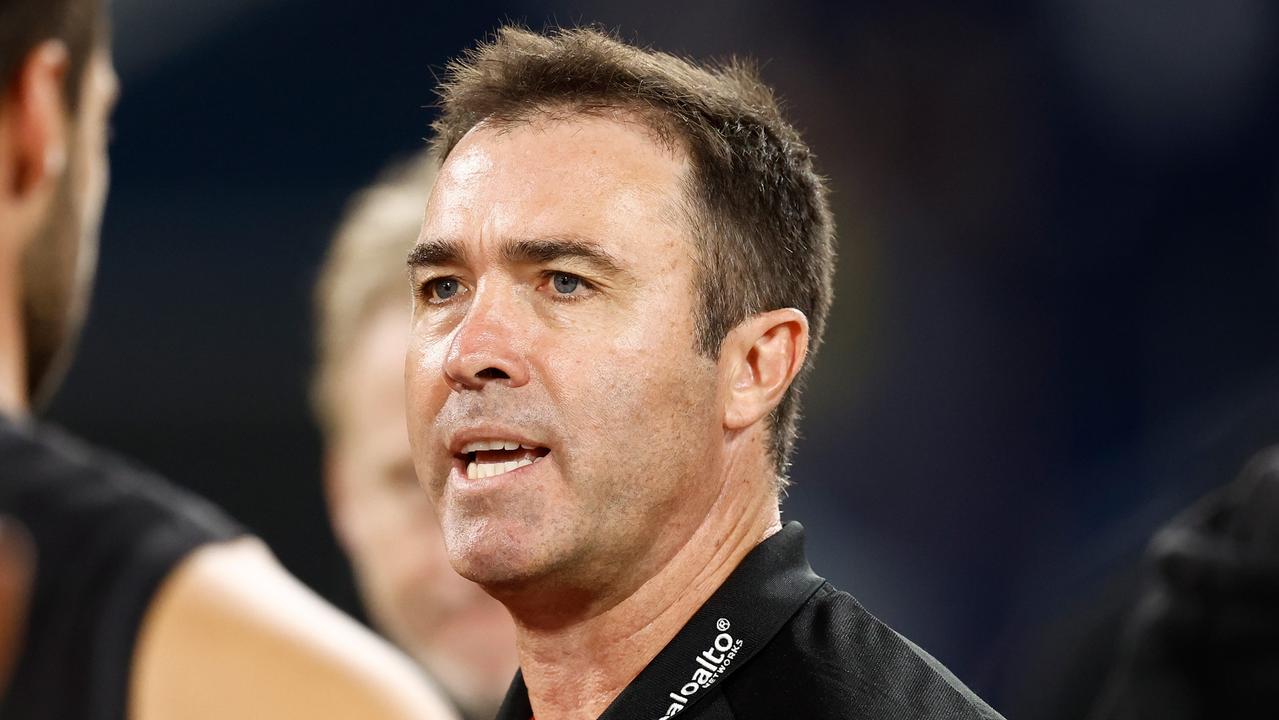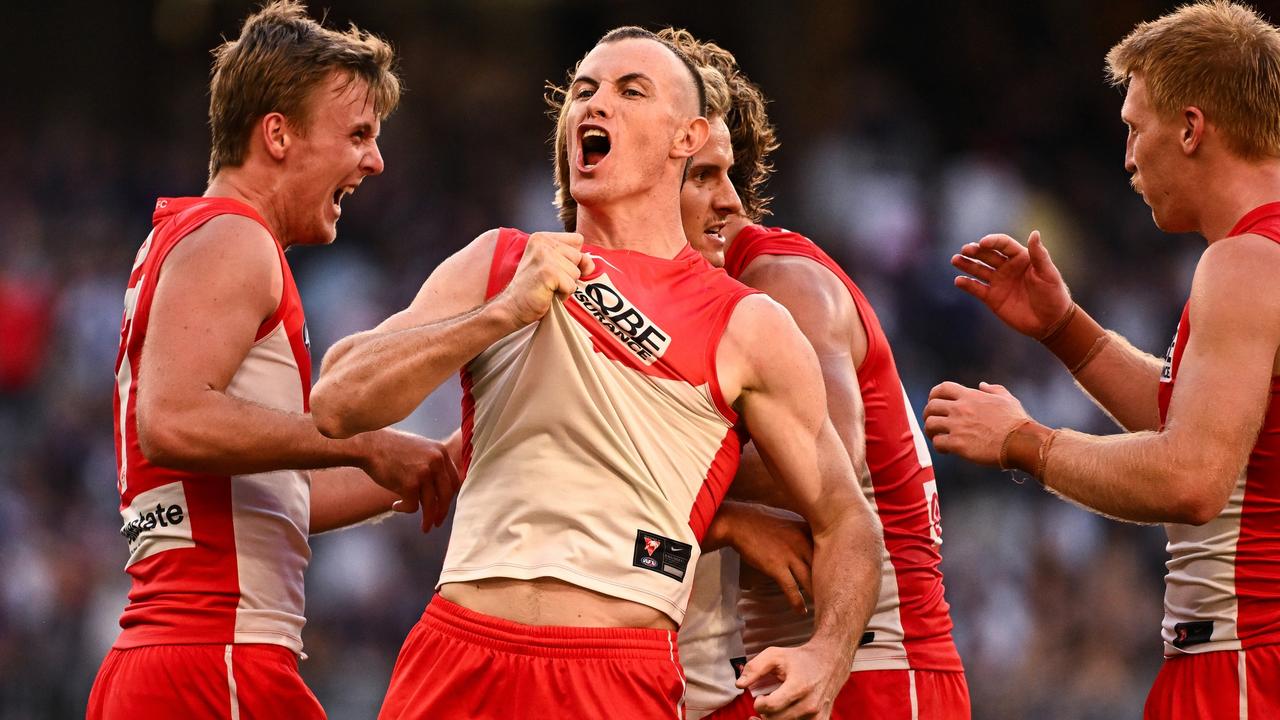AFL greatest team of the decade: You decide the best team since 2010
Over 20,000 votes were cast across our Round 1 matches to decide the greatest team of the decade. And premiership hero Mick McGuane is shocked that the triumphant Richmond 2017 side made it through over their strong opponent. See all the results.
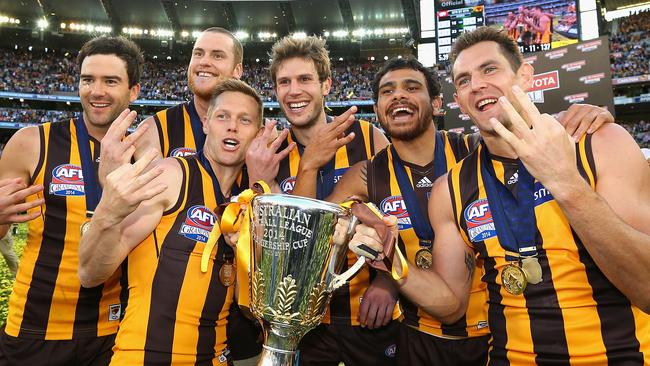
AFL
Don't miss out on the headlines from AFL. Followed categories will be added to My News.
Geelong’s 2010 side would succeed with “Operation: Stop Dustin Martin” and the Cats had superior star-power and scoring-power to Richmond’s premiership side of 2017.
That is the view of Collingwood 1990 premiership hero Mick McGuane, who has expressed his surprise that fans took an opposing view when voting on the match up in the Herald Sun’s AFL Team of the Decade.
While McGuane picked Geelong’s 2010 team to beat Richmond’s 2017 side, fans sided with the Tigers in the online voting by a majority of 73 per cent.
Geelong lost its preliminary final against eventual premier Collingwood by 41 points in 2010, but McGuane said that did not mean the Cats could not have beat Richmond’s 2017 premiership line-up.
“The Geelong 2010 team was a bloody good side,” McGuane said.
Relive classic AFL matches from the 60s to today on KAYO SPORTS. New to Kayo? Get your 14-day free trial & start streaming instantly~
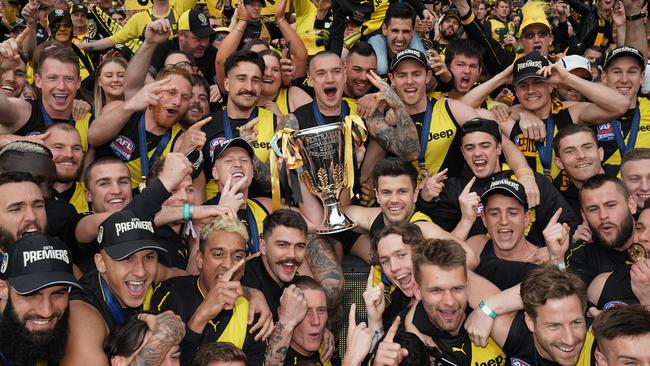
“The personal in front of the ball for Geelong – Cam Mooney, James Podsiadly, Tom Hawkins – would have really challenged Richmond’s 2017 defenders David Astbury, Alex Rance and Dylan Grimes.
“We’re also talking about a team that also really knew how to win the footy because of Gary Ablett, Jimmy Bartel, Joel Corey, Joel Selwood, Stevie Johnson, Matthew Stokes, Paul Chapman.
“Geelong was the No. 1 ranked team in points for in 2010. They averaged 112 points per game. Whereas Richmond in 2017 only averaged 91 points per game. So Geelong had the potency to score but they also had the defence to back it up.”
McGuane said Geelong’s 2010 team also had the ability to limit Richmond’s 2017 star and Brownlow Medal winner Dustin Martin.
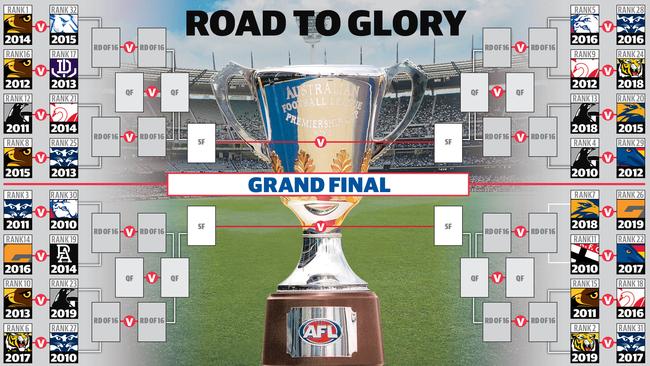
“While you’re in the midfield, Dusty, guess who’s standing alongside you? Cameron Ling,” McGuane said.
“Some would say Dusty might be too damaging with that initial speed Dusty has got that Cameron Ling didn’t. That’s okay. We’ll put Ling across to Trent Cotchin and we’ll put Dusty head-to-head with Ablett or Bartel.
“When Dusty goes forward, Geelong could have put Matthew Scarlett on him, probably the best defender we’ve seen since Silvagni. What a match up that would be. I’d like to say with confidence Dusty would beat him, but I haven’t got the confidence to say that.”
Who were the opening round winners and losers?
Check out the top half of the bracket below and see the bottom half here: BOTTOM HALF RESULTS
MATCH 1: HAWTHORN 2014 V NORTH MELBOURNE 2015
HAWTHORN 2014 (No.1 seed)
Coach: Alastair Clarkson (Brendon Bolton acting)
Captain: Luke Hodge
Won: 20. Lost: 5
Premiers
KEY STATS
– Ranked No.1 that season for points scored, points from turnovers, points from stoppages and goals per inside 50.
– Ranked No.1 for disposal differential and uncontested possession differential.
– Ranked No.2 for kicking efficiency differential and No. 3 for disposal efficiency differential.
STRENGTH
One of the great premiership campaigns, achieved despite the off-season defection of Lance Franklin to Sydney, a spate of injuries to big-name stars including Cyril Rioli, Sam Mitchell, Josh Gibson, Brian Lake and Luke Hodge, and the shock mid-season absence of master coach Alastair Clarkson, struck down by a rare health condition, Guillain-Barré syndrome. Just three Hawks made the All-Australian team in 2014 (Jarryd Roughead, Jordan Lewis and Luke Breust), a testament to the depth and game plan that kept the team ticking over through the winter before the Hawks hit their stride when it counted in September. Finished second on the ladder after the home-and-away season. Then accounted for nemesis Geelong by six goals in the qualifying final, hung on by just three points in the prelim against a fast-finishing Port Adelaide and thumped Buddy’s Swans by 63 points in the big one. Roughead, Breust and Jack Gunston covered comfortably for Franklin’s departure, booting 190 majors between them in a high-scoring team that averaged 112 points per game.
WEAKNESS
None of their own making. Clarkson had been planning for life without Franklin, but few clubs could have endured such a wretched run of luck on top of the loss of their superstar player and still brought home the bacon. Such was their impenetrable system, Brendon Bolton registered wins in all five matches he filled in for Clarkson.
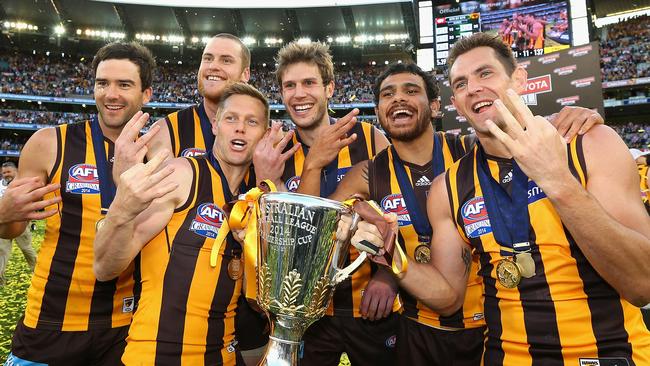
NORTH MELBOURNE 2015 (32)
Coach: Brad Scott
Captain: Andrew Swallow
Won: 15. Lost: 10.
Finished eighth on home-and-away ladder, then lost preliminary final to West Coast by 25 points.
KEY STATS
– Ranked No.5 for points scored and points from turnovers.
– Ranked No.3 for generating both a score and a goal from inside 50.
– Ranked No.4 for clearance differential and No.5 for contested possession differential.
STRENGTH
Finished eighth after the home-and-away season with 13 wins and nine losses before two huge finals wins against Richmond (fifth) in the elimination final and Sydney in Adam Goodes’ farewell game at Homebush. The Kangas started the year slowly but got on a roll to win seven-straight games from Rounds 15-21 before they sensationally rested half their team for the final-round clash against Richmond at Docklands. The gamble paid off the following week when they ran over the top of the Tigers in the MCG rematch. Brent Harvey passed 400 games in a midfield that featured Ben Cunnington, Nick Dal Santo, Jack Ziebell, Shaun Higgins (in his first year at North) and ruckman Todd Goldstein near his peak. Free agent Jarrad Waite, Ben Brown, Drew Petrie, Lindsay Thomas and Higgins each kicked more than 30 goals for the season, while Ben Jacobs emerged as A-grade tagger.
WEAKNESS
Went 3-6 against top-eight teams during the regular season. A typical hardworking Kangaroos team of the Brad Scott era that just lacked the class, polish and X-factor to take the next step. Had their chances early in the prelim in Perth to build on a 20-point lead, but bad kicking is bad football. Injuries to Daniel Wells early in the season and Thomas at the business end didn’t help. Lost Scott for a month (replaced by Darren Crocker) mid-season because of a serious back injury.
MICK McGUANE’S VERDICT
Hawthorn wins. The skill of Hawthorn in 2014 was really evident, while for North Melbourne it was their heart that shone through. Sam Mitchell was the Hawks’ midfield barometer, while Ben Jacobs was the Roos’ unsung hero. He had a history of stopping some very good players, but even if he did shut Mitchell down it wouldn’t be enough to stop the Hawthorn juggernaut. The Hawks were a really good stoppage team and a great intercept team. They were full of class, possessed great skill and also had a rock solid defence, with the likes of Brian Lake, Josh Gibson and Ben Stratton, who would be able to curtail the likes of Drew Petrie, Ben Brown and Jarrad Waite.
VOTE FOR YOUR WINNER
MATCH 2: HAWTHORN 2015 V GEELONG 2013
HAWTHORN 2015 (8)
Coach: Alastair Clarkson
Captain: Luke Hodge
Won: 19. Lost: 7.
Premiers
KEY STATS
– Ranked No.1 for both points scored and points against.
– Ranked No.1 for points scored from turnovers, points against from turnovers and points differential from turnovers.
– Ranked No.1 for turnovers created in the forward half and points scored from these turnovers.
STRENGTH
A drink-driving charge against skipper Luke Hodge on the eve of the finals appeared to threaten the Hawks’ bid for a historic hat-trick of flags. They duly went down to West Coast in the qualifying final by 32 points, but rebounded magnificently via the long road, crushing Adelaide in the second semi-final and Fremantle in a preliminary final in Perth. A ruthless 46-point demolition of the Eagles in the Grand Final handed Clarkson his fourth flag as a coach and saw seven of his charges — Cyril Rioli, Luke Hodge, Jordan Lewis, Sam Mitchell, Grant Birchall, Jarryd Roughead and Shaun Burgoyne (one at Port Adelaide) — become four-time premiership players in one of the greatest teams of all-time. Finished third after the home-and-away with 16 wins, six losses and a massive percentage of 158.4.
WEAKNESS
Old father time was knocking and it proved the end of another golden era at Hawthorn. Mitchell, Lewis and Bradley Hill would be out the door 12 months later and Hodge a year after that as a ruthless Clarkson got started on another rebuild.
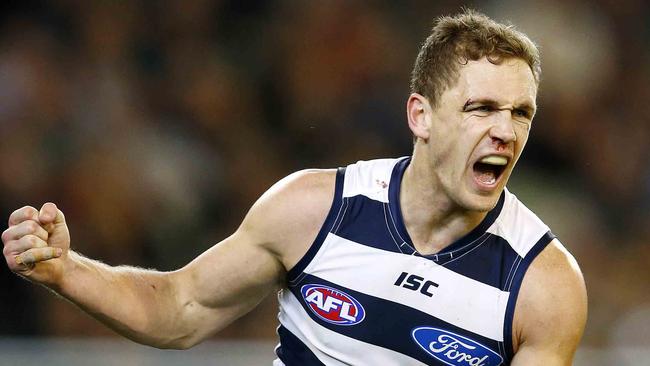
GEELONG 2013 (25)
Coach: Chris Scott
Captain: Joel Selwood
Won: 19. Lost: 6.
Lost preliminary final to Hawthorn by five points.
KEY STATS
Ranked No.1 for points scored from turnovers and points differential from turnovers.
Ranked No.1 for time spent in forward half and turnovers created in the forward half.
Ranked No.1 for kicking efficiency differential.
STRENGTH
The Cats won 18 of 22 home-and-away games to finish second on the ladder behind Hawthorn. The Cats were shock losers to Fremantle in a home qualifying final at Kardinia Park, accounted for Port Adelaide in the second semi-final at the MCG and lost to Hawthorn by five points in the prelim. The Cats of 2013 won their first seven games and lost just six for the entire season — all by 15 points or less — in Chris Scott’s third year in charge. The backline was outstanding with Harry Taylor, Corey Enright and Andrew Mackie joining skipper Joel Selwood as All-Australians. Tom Hawkins led the Cats’ goal kicking with 49, despite carrying a serious back injury.
WEAKNESS
Suspensions to key players across the year proved costly, none more so than Paul Chapman. He missed the preliminary final — a game the Cats led by 20 points at three-quarter-time before being overrun as the “Kennett curse” was put to rest. Despite having five big men on the list, the ruck was yet again a glaring weakness. Geelong also blew a golden opportunity after being gifted a home qualifying final at the Cattery.
MICK McGUANE’S VERDICT
Hawthorn just. The Hawks of 2015 were known for being a very good structural team that was hard to penetrate. Both teams were ranked No.1 in scoring from intercepts in their respective season. Then it would come down to which side could execute its skill to pierce the opposition structure to score. I feel Hawthorn would just get over the line on the back of Sam Mitchell’s influence and Cyril Rioli, who had an incredible year in 2015. If you look deeply into the Hawthorn v Geelong clashes since the start of 2013, who stopped Rioli? He never had a real constant player against him in 2013, ’14 and ’15. In this fantasy game, I’d urge Chris Scott to bite the bullet and play Cameron Guthrie on him.
VOTE FOR YOUR WINNER
MATCH 3: COLLINGWOOD 2011 V SYDNEY 2014
COLLINGWOOD 2011 (12)
Coach: Mick Malthouse
Captain: Nick Maxwell
Won: 22. Lost: 3.
Minor premiers, but lost the Grand Final to Geelong by 38 points.
KEY STATS
– Ranked No.2 for points scored and No. 1 for points against.
– Ranked No.1 for point differential from turnovers and stoppages.
– Ranked No.1 for contested possession differential and No.2 for inside-50 differential.
STRENGTH
These powerhouse Magpies dominated the home-and-away season to finish on top of the ladder with 20 wins and two losses and a whopping percentage of 167.7. They lost only three games for the year — all to Geelong — including the big one. The reigning premiers played magnificent football for the bulk of the season, possibly at a higher level than the previous year, typified by a mesmerising eight-goal last quarter burst against the Bulldogs in Round 6. Luke Ball’s snap in the preliminary final to sink Hawthorn brought Malthouse to tears in the coaches’ box. Collingwood led by 15 points 23 minutes into the second quarter of the Grand Final, but faded badly.
WEAKNESS
Eddie McGuire’s contentious transfer-of-power coaching arrangement between Malthouse and Nathan Buckley blew up in his face in 2011. Malthouse had pulled together a dominant, premiership-winning team but struggled to contain his bitterness as his enforced final season wore on, culminating in an explosive tell-all interview on The Footy Show. Nagging injuries to players such as Ben Reid late in the season also hurt, particularly as a young Tom Hawkins ran riot in the Grand Final. Malthouse later conceded he may have waited too long before making a switch, or should even have asked a retired star to come back. “If you had your life over again, I would talk Simon Prestigiacomo out of retirement,” Malthouse said. “He may have said no.”
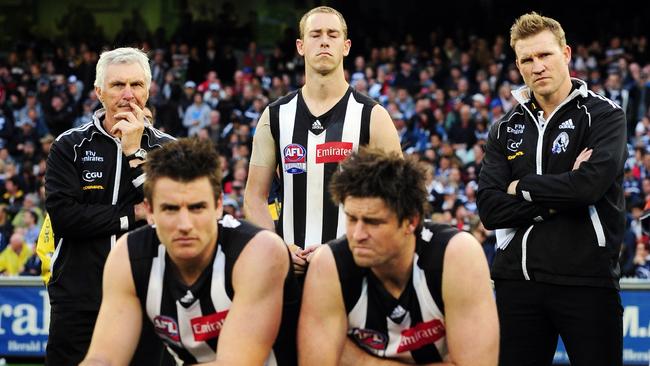
SYDNEY 2014 (21)
Coach: John Longmire
Captains: Jarrad McVeigh/Kieren Jack
Won: 19. Lost: 6.
Minor premiers, but lost the Grand Final to Hawthorn by 63 points.
KEY STATS
– Ranked No.4 for points scored and No. 1 for points against.
– Ranked No.2 for points scored from turnovers and points differential from turnovers.
– Ranked No.2 for inside-50 differential and No.3 for time in forward half differential.
STRENGTH
Sydney pulled off the recruiting coup of the century by signing Lance “Buddy” Franklin on a nine-year, $10 million deal just a year after it secured fellow power forward Kurt Tippett. The Big Bud delivered as he collected his third Coleman Medal, finished second in the Brownlow Medal count and booted four goals in the Grand Final. He also joined teammates Josh Kennedy, Nick Smith and Nick Malceski in the All-Australian team. The Swans were the best team in the competition defensively and conceded an average of just 67.6 points per game. They lost three of their first four games before winning 16 of the next 18 (including 12 on the trot) to claim the minor premiership. Beat Fremantle in week one of the finals at Homebush and North Melbourne in the prelim by 71 points before being trounced by the Hawks in the granny.
WEAKNESS
Humiliated on Grand Final day despite going in as warm favourites. The much-vaunted Franklin-Tippett double act failed to fire after the highly-paid Tippett missed the bulk of the season through injury. Young guns Lewis Jetta (four disposals), Gary Rohan (seven) and Sam Reid (eight) went missing on the last Saturday in September.
MARK ROBINSON’S VERDICT
Collingwood just. The Pies finished the home-and-away season with a decade-best 20-2 win-loss record, and were eventually taken down by Geelong in the final quarter of the 2011 Grand Final. Sydney was 17-5 and also finished on top before it was comprehensively beaten in the Grand Final by Hawthorn. But it was a fair effort against the Hawks, whose 2014 team is the No.1 ranked team in this competition. Both Collingwood and Sydney played tough, contested footy, but I suspect Collingwood’s slight edge in class would have proved the difference.
VOTE FOR YOUR WINNER
MATCH 4: HAWTHORN 2012 V FREMANTLE 2013
HAWTHORN 2012 (16)
Coach: Alastair Clarkson
Captain: Luke Hodge
Won: 19. Lost: 6.
Minor premier, but lost the Grand Final to Sydney by 10 points.
KEY STATS
– Ranked No.1 for points scored, score per inside 50 and goal per inside 50.
– Ranked No.1 for points scored from turnovers and points differential from turnovers.
– Ranked No.1 for points scored from stoppages and points differential from stoppages.
STRENGTH
Minor premier (for the first time since 1989) with 17 wins and five losses in the home-and-away rounds. Beat Collingwood comfortably in the qualifying final and Adelaide by just five points in an epic twilight preliminary final before going down in the Grand Final. A young Luke Breust snagged 45 goals for the year, Bradley Hill and Isaac Smith emerged from the pack and Sam Mitchell finished second in the Brownlow (tied with Trent Cotchin). He and Cotchin were later recognised as the joint winners after Jobe Watson’s WADA suspension. A star-studded young team on the brink of a golden era.
WEAKNESS
The one that got away. Lost a couple of players to injury late in the season and failed to fire on the biggest stage. Lance Franklin booted 13 goals against North Melbourne in Launceston but his wayward kicking throughout the season — including several missed shots in the GF — was a talking point he would work hard to rectify. The off-season recruitment of Western Bulldog key defender Brian Lake would fix another glaring problem.
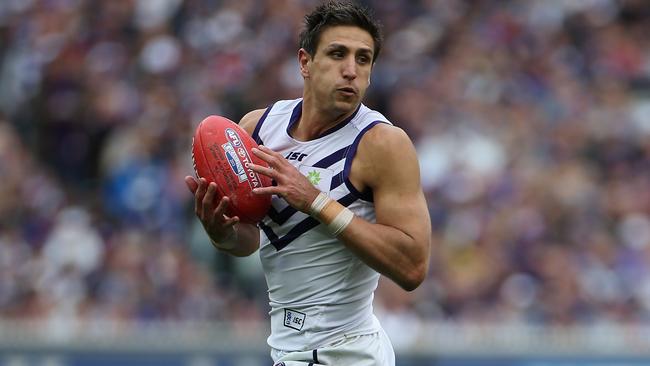
FREMANTLE 2013 (17)
Coach: Ross Lyon
Captain: Matthew Pavlich
Won: 19. Lost: 6
Lost the Grand Final to Hawthorn by 15 points.
KEY STATS
– Ranked No.1 for points against and opposition score per inside 50.
– Ranked No.1 for points against from turnovers and No.3 for points against from stoppages.
– Ranked No.2 for disposal efficiency and kicking efficiency differential.
STRENGTH
For so long the laughing stock of the competition, the Fremantle that emerged in 2013 was cast from the same mould as its second-year senior coach Ross Lyon — fierce and uncompromising. Lyon’s fiery post-match press conference at Kardinia Park after the qualifying final victory (interrupted by hissing toilet cisterns in the room next door) was reflective of a club rightfully peeved that the game had not been played at the Docklands or the MCG. The wily Lyon set the scene for the introduction of a pre-finals bye by resting half of his team for the club’s final-round clash against St Kilda at Etihad Stadium. Nathan Fyfe emerged a bona fide star during a season in which the Dockers won 12 of 13 games at the House of Pain. They finished the home-and-away season in third place with 16 wins, five losses and a draw before the epic qualifying final win at the Cattery.
WEAKNESS
Had their chances on Grand Final day (the one and only in the club’s history) but just 1.6 (12) by halftime and poor kicking for goal on a windy afternoon proved costly. Matthew Pavlich always needed an A-grade power forward alongside him, but Fremantle could never land a good one.
MARK ROBINSON’S VERDICT
A tough match-up as both were beaten Grand Final teams. Hawks lost to Sydney by 10 points after scraping home by five points against Adelaide in the twilight preliminary final at the MCG. The Dockers, under Ross Lyon, beat Geelong and Sydney before losing to the Hawks by 15 points in the Grand Final. This was Lyon’s highest finish at Fremantle. If they had converted their inside 50s – they kicked 8.14 to 11.11 – the premiership could’ve been won. Will opt for the Dockers here.
MATCH 5: COLLINGWOOD 2010 V ADELAIDE 2012
COLLINGWOOD 2010 (4)
Coach: Mick Malthouse
Captain: Scott Pendlebury
Won: 20. Lost: 4. Draws: 2.
Premiers in GF replay against St Kilda, winning by 56 points.
KEY STATS
- Ranked No.2 for both points scored and points against.
- Ranked No.1 for points from turnovers, points against from turnovers and points differential from turnovers.
- Recorded a time in forward half differential of +15min 58sec per game — the highest ever recorded.
STRENGTH
This was a dominant Collingwood outfit from wire to wire. It was in the back-end of the season that the Magpies truly flexed their muscle as they dropped just one game in the final 10 home-and-away rounds to close out their most successful regular season in 80 years. Forward pressure was a key asset for this balanced team. Dane Swan proved a particular standout and was considered by many to be unlucky not to take out the Brownlow Medal after he averaged almost 32 touches per game and collected a swag of individual awards.
WEAKNESS
How do you find a weakness in a team that lost just four games? If anything, inaccuracy was a shortfall for Collingwood and plagued the team for most of the year. It almost cost it the drawn Grand Final — Collingwood kicked 9.14 to St Kilda’s 10.8. Malthouse stayed the course and maintained that he was unfazed by the statistic, but conceded he didn’t “want it to bite us”. The Pies relied heavily on midfield and forward pressure — which was a particular strength — but was often difficult to maintain.
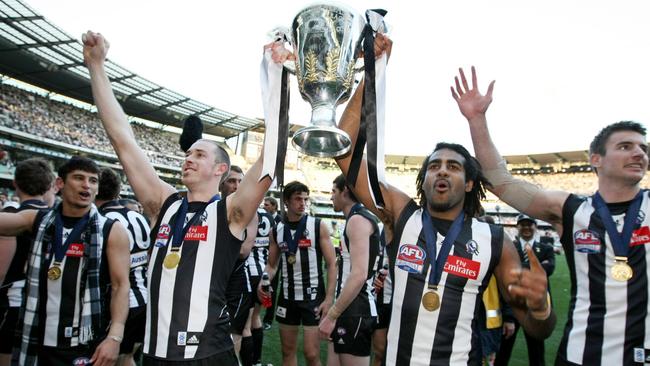
ADELAIDE 2012 (29)
Coach: Brenton Sanderson
Captain: Nathan van Berlo
Won: 18. Lost: 7.
Lost to Hawthorn by five points in preliminary final.
KEY STATS
Ranked No.3 for points scored, No. 1 for goal per inside 50 and No. 2 for score per inside 50.
Ranked No.2 clearance differential, points scored from clearances and points differential from clearances.
Ranked No.1 for contested possession differential.
STRENGTH
Sanderson hit the ground running in his first year as Crows coach and managed to produce the surprise packet of 2012. Talk about a turnaround — this team went from a seven-win season and 14th on the ladder in 2011 to a preliminary final loss to eventual premier Hawthorn. Adelaide was aggressive and dominant in contested ball, led by midfielder Patrick Dangerfield — who notched 403 contested possessions — and Scott Thompson. “The challenge with Patty Dangerfield is that often when you are actually trying not to let him run free, he runs free anyway, because he’s so quick. It’s a bit like Goodesy,” Sydney coach John Longmire said of Dangerfield that year.
WEAKNESS
Too reliant on the likes of Dangerfield, especially when hit by injuries. Key players went down during the finals, including rising star winner Daniel Talia and defender Sam Shaw. If anything, experience was probably the thing that cost the Crows, with an emerging midfield and the likes of Taylor Walker up forward who was only 22. Sanderson lashed his team midway through the season when they fell short of North Melbourne, declaring many “impostors” that had been “embarrassed at certain parts of our game”. They rebounded to win eight of their next 10 matches, plus a home semi-final. Kurt Tippett departed to Sydney at the end of the season.
MICK McGUANE’S VERDICT
Collingwood. This is the battle of the mids. The Pies’ contingent of Dane Swan, Scott Pendlebury, Luke Ball, Dale Thomas, Dayne Beams and Steele Sidebottom against Patrick Dangerfield, Scott Thompson, Rory Sloane, Richard Douglas, Bernie Vince, and a bit of Nathan van Berlo. The Darren Jolly versus Sam Jacobs ruck battle would also be important. For Adelaide, Kurt Tippett and Taylor Walker are its big threats. Nathan Brown would go to Tippett and Ben Reid to Walker. Heath Shaw would go to Jason Porplyzia to nullify his influence and Nick Maxwell would act as that loose defender to help out in the air. At the other end, Collingwood’s attack — with Travis Cloke, Chris Dawes and Leigh Brown — would stretch the Crows and that’s where the winning difference would be found.
MATCH 6: WESTERN BULLDOGS 2016 V GEELONG 2016
WESTERN BULLDOGS 2016 (5)
Coach: Luke Beveridge
Captain: Bob Murphy
Won: 19. Lost: 7.
Premiers
KEY STATS
Ranked No.1 for disposal and contested possession differential, and ranked No.2 for uncontested possession differential.
Ranked No.2 for inside 50 differential and time in forward half differential.
Ranked No.3 for points against and No.2 for points against from turnovers.
STRENGTH
Win it from seventh? It was said to be near-on impossible. But these Bulldogs and their mix of heart and hardness achieved the ultimate under Beveridge, who struck the balance perfectly — with a Charlie and the Chocolate Factory reference or two along the way, no less. The cohesion of this young outfit and in particular the “handball club”, which reaped the benefits of hours of work with their hands to absorb tackles and still keep the ball moving quickly, proved a major difference to the rest of the competition.
WEAKNESS
Injuries to vital cogs in the operation threatened to derail the Dogs, virtually from the outset. Skipper Bob Murphy was felled with a heartbreaking ACL tear in Round 3, before Jake Stringer (shoulder), Luke Dahlhaus (knee) and Tom Liberatore (ribs) also had their battles. But it was Round 18 that threatened the biggest blow when Mitch Wallis suffered a horrific broken leg and Jack Redpath ruptured his ACL for a second time. Dale Morris also did his hamstring on the same night. Beveridge described it as a “devastating night”, with reports suggesting that “their plethora of injuries have surely ruined any chance of a deep run into September”. If only they knew what was to come.
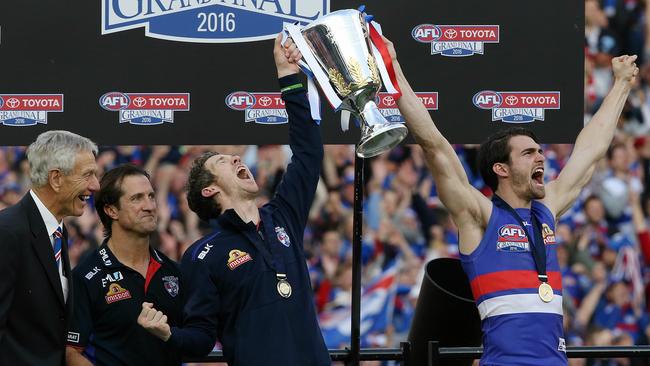
GEELONG 2016 (28)
Coach: Chris Scott
Captain: Joel Selwood
Won: 18. Lost: 6.
Lost preliminary final to Sydney by 37 points.
KEY STATS
— Ranked No.3 for points scored and No. 2 for points against.
— Ranked No.4 for points scored from turnovers, No.1 for points against from turnovers and No.2 for points differential from turnovers.
— Ranked No.2 for contested possession differential, and No.1 for time in forward half and inside 50 differential.
STRENGTH
Welcome, Paddy. To say he made himself at home at the Cattery would be an understatement. It was one of Patrick Dangerfield’s best seasons. Top-two ladder finish? Tick. Club best-and-fairest? Tick. And a little award called the, what is it again? Oh yes, the Brownlow. Tick. Dangerfield and Selwood proved a brilliant one-two punch in a Cats midfield that fed to an attack including the likes of Tom Hawkins and, when fit, the electric Daniel Menzel. A lot of additions to the team took some jelling but to rise from 10th on the ladder to second doesn’t happen easily.
WEAKNESS
Often struggled to convert its inside-50s into something fruitful, but an inability to withstand the pressure dished up to them by Sydney in the preliminary final delivered the final blow. Were very reliant on Dangerfield and Selwood — and why wouldn’t you be?! — while Menzel was in and out with injury. Scott was also criticised for sticking with players for too long rather than tinkering with the team. Slow starts troubled the side midway through the season and proved another thorn in the preliminary final.
MICK McGUANE’S VERDICT
Geelong. It may be controversial but I think Geelong would have beaten the Bulldogs in the 2016 grand final had it got past Sydney. The Cats played and beat the Dogs twice that year by 57 and 25 points. They had bulls in Patrick Dangerfield, Joel Selwood and Jimmy Bartel along with the class of Mitch Duncan, who always influenced the game, against Tom Liberatore, Marcus Bontempelli and Jack Macrae. We know Tom Boyd had a great ifinals series, but Tom Lonergan would have shut him down. They would have nullified the Dogs’ unconventional forward line of that year. Geelong was their nemesis in 2016 and for that reason I’ve gone for the Cats.
MATCH 7: SYDNEY 2012 V RICHMOND 2018
SYDNEY 2012 (9)
Coach: John Longmire
Captain: Jarrad McVeigh
Won: 19. Lost: 6.
Premiers
KEY STATS
– Ranked No.1 for points against, conceding a score from an opposition inside-50 and points against from turnovers.
– Ranked No.3 for points scored from stoppages and points differential from stoppages.
– Kicked long more than any side in the competition and went forward by foot more than any side.
STRENGTH
This was real Bloods footy. And it was under the radar type stuff. While everyone was busy talking about Hawthorn, Geelong and Collingwood as the ones to watch, the Swans went quietly about their business, with the likes of Josh Kennedy enjoying a breakout season to earn All-Australian selection. They were able to overcome a few blips and shone in the finals series as their defensive strengths came to the fore, beating Adelaide, Collingwood and Hawthorn on their way to the flag.
WEAKNESS
More of a disappointment than a weakness — injuries. No one wanted to see Ben McGlynn and Gary Rohan miss out, the former dealt the heartbreak of injuring his hamstring in the qualifying final. Their age also worried some, with Ryan O’Keefe, Jude Bolton and Adam Goodes all over the age of 30, but all delivered when required. Very hard to knock a side that lifted the cup in such unexpected fashion. They were the true believers.
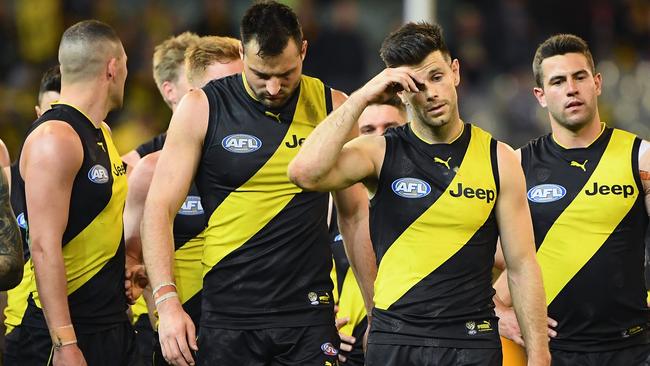
RICHMOND 2018 (4)
Coach: Damien Hardwick
Captain: Trent Cotchin
Won: 19. Lost: 5.
Minor premiers, but lost preliminary final to Collingwood by 39 points.
KEY STATS
— Ranked No.2 for both points scored and points against.
— Ranked No.1 for points scored from turnovers and points differential from turnovers.
— Ranked No.1 for time spent in forward half, forward half turnovers and points from forward half turnovers.
STRENGTH
Richmond carried on its 2017 flag form with gusto with largely the same line-up. The Tigers won seven of their first eight games to sit in the box seat for another tilt at the flag — or so most people thought. There were some truly forceful victories as their MCG reign rolled on and a crucial nailbiter against Geelong in Round 20 helped generate some vital late-season confidence. Jack Higgins proved a revelation after he was taken at pick 17 in the draft, with his goalkicking and gags valuable in equal measure.
WEAKNESS
Dustin Martin was nowhere near as dominant as he had been in 2017 and the team struggled on the road. They won just one of five games interstate and would have counted themselves lucky that they didn’t have to leave 3121 after Round 21. Their famed “swarm” tactic that had worked so well in their premiership year looked to have been analysed studiously by many sides over the off-season. But it all came down to that boilover preliminary final — and in particular THAT performance by “American Pie” Mason Cox — that all Tigers would love to be banished from their memories. Whether Dustin Martin should have played given his knee troubles was a huge talking point.
MARK ROBINSON’S VERDICT
You have to get it done in finals and Richmond blew it. The best team of the season — the Tigers were 18-4 after 22 rounds — failed mentally in the preliminary final against Collingwood. We can talk about the one that got away, but then it’s a case of woulda, shoulda and didn’t. The Swans of 2012 beat Adelaide in Adelaide in the first final, beat Collingwood at home in the prelim and then were too solid for the Hawks in the GF. No mental let-down from this mob. We will take the Swans.
MATCH 8: COLLINGWOOD 2018 V WEST COAST 2015
COLLINGWOOD 2018 (13)
Coach: Nathan Buckley
Captain: Scott Pendlebury
Won: 17. Lost: 9.
Lost Grand Final to West Coast by five points.
KEY STATS
— Ranked No.1 for clearance differential and No.5 for points differential from stoppages.
— Ranked No.4 for turnovers created in the forward half and time spent in the forward half.
— Ranked No.1 for disposal differential, uncontested possession differential and No.2 for contested possession differential.
STRENGTH
It was always going to be the ultimate test of their mettle, after sticking with coach Nathan Buckley following a fourth-straight year without finals and two losses in the opening rounds. There were risks, Buckley acknowledged, and while the team didn’t achieve the ultimate success, it was a year of welcome change. The transformation of Buckley — a former player, stringent in his own preparation and expectations while wearing the black and white — proved one of the biggest assets to the team, with his willingness to embrace change and imperfection and build stronger relationships at the club. The change was evident and a stellar season ultimately fell just one kick short.
WEAKNESS
Injuries cost the Magpies, starting with defender Tyson Goldsack rupturing his ACL in a practice match. Tim Broomhead suffered a broken leg and there were a handful of hamstring complaints for Darcy Moore. Adam Treloar was another. He hurt both hamstrings at once in Round 14 as the injury toll grew on Olympic Boulevard. Ben Reid? Calf. Jamie Elliott? Hamstring. Daniel Wells? Foot. Lynden Dunn? ACL. Jeremy Howe? Leg. They couldn’t take a trick. The lack of defenders meant others had to step up in the finals and ultimately in the Grand Final against an array of tall Eagles forwards.
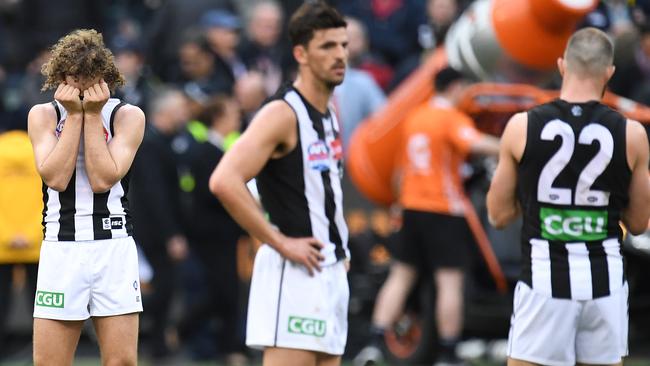
WEST COAST 2015 (20)
Coach: Adam Simpson
Captain: Shannon Hurn
Won: 18. Lost: 6. Drew: 1.
Lost Grand Final to Hawthorn by 46 points.
KEY STATS
— Ranked No.2 for points scored, No.1 for score per inside 50 and No.2 for goals per inside 50.
— Ranked No.2 for point differential from turnovers and No.1 for points differential from stoppages.
— Ranked No.1 for time in forward half differential and No.2 for inside-50 differential.
STRENGTH
Talk about a second-year surge. Adam Simpson took the team from ninth on the ladder — the year Matt Priddis won the Brownlow — to the premiership decider. The protective “Weagles Web” became a brainbuster for opposition coaches in the second half of the season, with the losses of key backs Mitch Brown and Eric McKenzie to injury offset by a system that Richmond coach Damien Hardwick described as “some unbelievable stuff”. “Their zoning is as good as we’ve seen this year,” he said.
MORE AFL
AFLPA boss Paul Marsh fires back at Eddie McGuire over union attack
Go inside Tony Lockett’s remarkable 1996 season for the Sydney Swans
WEAKNESS
Experience probably cost the Eagles, with Simpson later admitting that composure and maturity had been key assets to his side saluting in 2018. Poor kicking for goal “killed” his side in the 2015 Grand Final — West Coast booted 8.13 (61) against Hawthorn — and finals series as a whole, Simpson said, and they didn’t handle the pressure. Injuries also took their toll. Brown and McKenzie missed for the season’s entirety and Will Schofield and Jeremy McGovern were also hampered for periods.
MARK ROBINSON’S VERDICT
Magpies for me. West Coast, under Adam Simpson in just his second season, finished ninth in 2014 and played off for the title in 2015. It was a remarkable coaching and team performance, although Simpson has said his team wasn’t as ready — experience the key, he said — as it was when it won in 2018. They defeated Collingwood that year in what will be remembered as one of the great GFs. Nathan Buckley kept his job after the Pies finished 13th in 2017 and ended up being a straight kick off being premiers in 2018.
GREATEST TEAM OF THE DECADE
MATCH 1: RICHMOND 2019 V GEELONG 2017
RICHMOND 2019 (No. 2 seed)
Coach: Damien Hardwick
Captain: Trent Cotchin
Won: 19 Lost: 6
Premiers
KEY STATS
Ranked No. 2 for points scored and No. 3 for points against.
Ranked No. 1 for points scored from turnovers, No. 3 points against from turnovers and No. 1 points differential from turnovers.
Ranked No. 2 for inside 50 differential and No. 3 for time in forward half differential.
STRENGTH
The final three months of the season were, in a word, perfect. The 89-point Grand Final annihilation of Greater Western Sydney exemplified the gap Richmond had on the rest of the league. Dominant in all phases of the game and yet they had the chutzpah to hand Marlion Pickett a debut in the biggest game of all. The Tigers celebrated the VFL premiership a week before the AFL one and also signed up 100,000 members. Norm Smith Medal winner Dustin Martin booted four goals in the Grand Final and six majors as the Tigers stormed the Gabba in the qualifying final. But his season went unnoticed by All-Australian selectors. Defenders Bachar Houli and Dylan Grimes were the only Tigers in the team of the year, highlighting their squad mentality.
Relive classic AFL matches from the 60s to today on KAYO SPORTS. New to Kayo? Get your 14-day free trial & start streaming instantly~
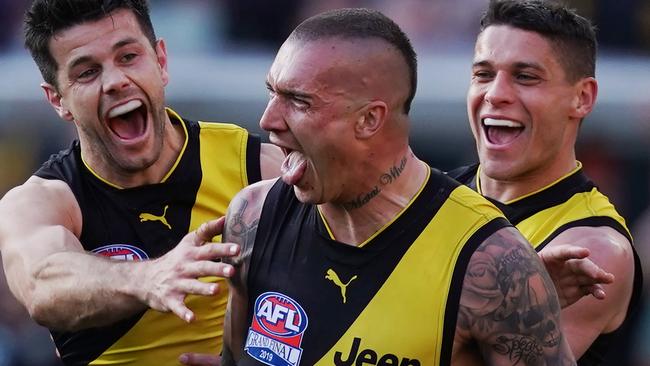
WEAKNESS
Lost Alex Rance to a season-ending knee injury in Round 1 as the superstars fell like dominoes. Jack Riewoldt, Trent Cotchin, Martin and Grimes also missed early games and the Tigers were 7-6 when they turned after the bye. Those challenges only hastened the development of its next crop as Sydney Stack, Jack Ross and Shai Bolton emerged as serious prospects. They trailed minor premier Geelong by 21 points at halftime in the preliminary final and then kicked eight goals to two in their only really challenge deep in the year.
GEELONG 2017 (31)
Coach: Chris Scott
Captain: Joel Selwood
Won: 16 Lost: 8 Drew: 1
Finished second on home-and-away ladder, but lost preliminary final to Adelaide by 61 points.
KEY STATS
Ranked No. 4 for points scored and No. 3 for points scored from stoppages.
Ranked No. 2 for contested possession differential and uncontested possession differential.
Ranked No. 1 for disposal efficiency differential and No. 3 for kicking efficiency differential.
STRENGTH
Stormed to a 5-0 start which included an 86-point hiding of arch rival Hawthorn on Easter Monday. The Patrick Dangerfield-Joel Selwood combination was breathtaking and both players earned All-Australian selection. Only played seven games at GMHBA Stadium and won six, including a Round 21 win against eventual premier Richmond. A proppy Dangerfield booted 5.6 from full-forward to spoil Luke Hodge’s 300th game in an epic and later marked his second season as a Cat with a second best-and-fairest. Mitch Duncan also enjoyed his best year.
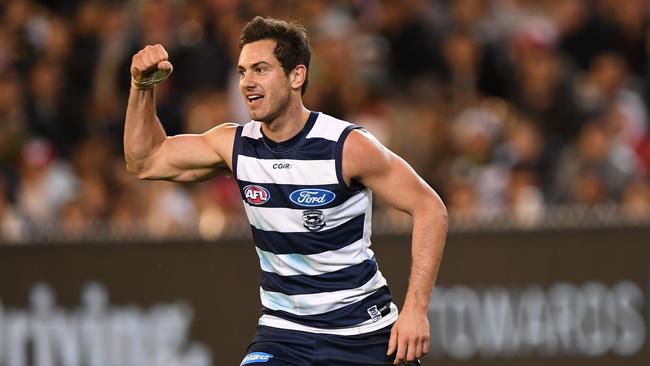
WEAKNESS
Billed as warm favourites for a qualifying final against Richmond, the Cats almost appeared spooked by the crowd of 95,028 which was largely against them. The Cats kicked just 5.10 (40) in a humbling 51-point loss — easily their smallest score for the season — and their season was effectively over by quarter-time of the preliminary final as they trailed Adelaide by 31 points at Adelaide Oval. It was a sour homecoming for Dangerfield although sandwiched between the big September defeats was a spirited win against a Sydney line-up that had won 12 of its past 13 games.
MICK McGUANE’S VERDICT
Richmond. This Tigers team is better placed than its 2017 model to beat the Cats of 2017. In that year, Tom Hawkins was crying out for some seniority around him up forward like he had enjoyed previously. At the other end of the ground, with an ageing defence the Cats had with Harry Taylor slowing up and Tom Lonergan and Andrew Mackie at the end of their careers, my argument is this: who would stop the Richmond power forwards? Who stops Dusty? Who stops Jack Riewoldt? Who goes to Tom Lynch? I question whether the Cats’ hybrid defenders could run with the Tigers’ mosquito fleet. That’s where I think the Tigers’ forward line of 2019 is too strong.
MATCH 2: WEST COAST 2018 V GWS GIANTS 2019
WEST COAST 2018 (7)
Coach: Adam Simpson
Captain: Shannon Hurn
Won: 19 Lost: 6
Premiers
KEY STATS
Ranked No. 3 for points scored, No. 4 for points against and No. 1 for goal per inside 50.
Ranked No. 3 for points scored from turnovers and points differential from turnovers.
Recorded the highest kick-to-handball ratio of any side and took the most marks in the competition.
STRENGTH
Lost the first ever AFL game at the new Perth Stadium and then won 11 of the following 13 to book a place in the Grand Final. The Eagles had a new House of Pain, and the MCG-sized dimensions eased the troubles travelling east. In fact, the Eagles went 5-0 in Victoria in 2018 to graduate from hometown bullies to everywhere kings. Adam Simpson’s coaching was widely lauded as he set up the “Weagles Web” as the likes of Jeremy McGovern and Shannon Hurn picked off entries with ease. In fact, McGovern’s decision to leave Jordan De Goey to intercept Adam Treloar’s kick late in the Grand Final set up the most glorious play in West Coast history as the Eagles attacked down the wing to set up Dom Sheed’s magical matchwinning goal.
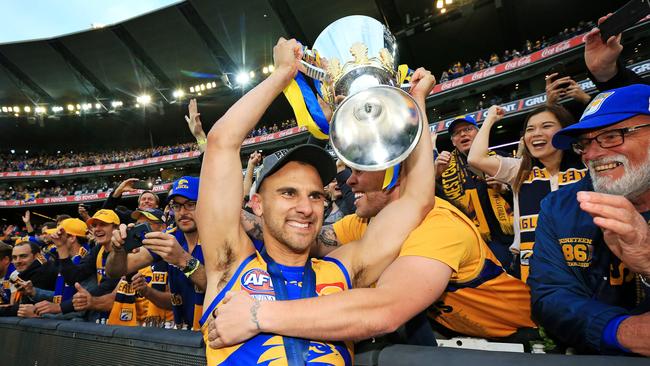
WEAKNESS
The Eagles trailed Collingwood 0.2 (2) to 5.0 (30) just 22 minutes into the Grand Final and were without three stars — Andrew Gaff (suspended), Nic Naitanui (knee) and the underrated Brad Sheppard (hamstring). The resilience to fight back both on Grand Final day and from those key outs highlighted the new-found resilience. Former Cat Nathan Vardy stepped up to replace Nic Nat, Will Schofield took Sheppard’s place and Sheed assumed more midfield responsibility in place of Gaff. Speculation that Gaff — who clocked Fremantle’s Andrew Brayshaw in an out-of-character brain explosion that cost him an eight-match suspension — would join North Melbourne also lingered, but he put pen to paper after the Grand Final. McGovern also turned down a godfather offer from Fremantle to re-sign.
GWS GIANTS 2019 (26)
Coach: Leon Cameron
Captain: Phil Davis
Won: 16. Lost: 10.
Made it to the Grand Final from sixth, but collapsed against Richmond and lost title decider by 89 points.
KEY STATS
Ranked No. 5 for points against and No. 1 for conceding a score from an opposition inside 50.
Ranked No. 2 for clearance differential and No. 3 for points differential from stoppages.
Ranked No. 2 for contested possession differential and No. 1 for uncontested possession differential.
STRENGTH
Villain Toby Greene and his Giants emerged as the story of September as the club surged from sixth into the Grand Final with three stunning victories underpinned by ferocious aggression. They bullied the baby Bulldogs in the elimination final and then knocked the Brisbane Lions out in straight sets with an epic victory at the Gabba. The boilover against Collingwood in the preliminary final was the club’s greatest win in its history, holding on at a wet MCG despite the Magpies booting the final 4.5 (29). Injured superstar Stephen Coniglio delivered a pre-finals boost to the club by recommitting for seven seasons while Jeremy Cameron’s 9.5 in Round 23 pinched the Coleman Medal.
WEAKNESS
The Giants lost co-captain Callan Ward to a season-ending knee injury in Round 4 and the blows kept on coming, and yet they kept on fighting on. Knee injuries ended Coniglio and Jon Patton’s season early and while Greene escaped a suspension for making contact to Marcus Bontempelli’s face in the elimination final, lightning did not strike twice. The tribunal — and subsequent appeal — rubbed Greene out of the preliminary final for an incident with Lachie Neale. While Greene returned for the Grand Final, Lachie Whitfield played just days after having his appendix removed and Phil Davis underwent a pre-game fitness test. The Giants were banged-up and lost by 89 points, but it was still a September to remember as anyone who doubted Leon Cameron’s coaching was silenced.
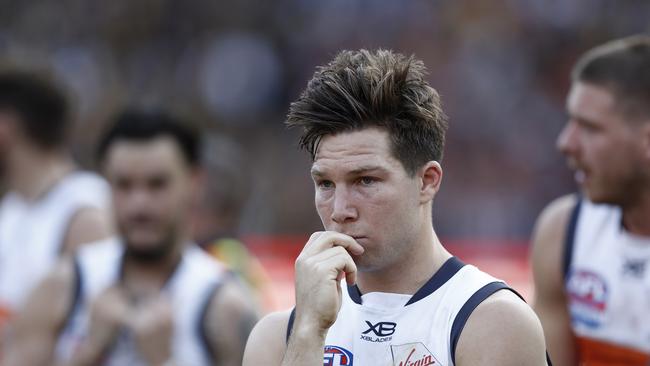
MICK McGUANE’S VERDICT
West Coast. Both sides loved to play keepings off and to possess the footy at all times. Both loved to kick-mark, be the first to register 90 marks for a game and get the win. The Eagles were really effective with their ball use and they usually ended up with more inside 50s than their opponent, whereas the Giants struggled in that area. Both teams could score and were even in terms of defence. I’ve picked the Eagles because they had the best turnover game in the league. Their ability to score post turnover was more efficient than the Giants.
MATCH 3: ST KILDA 2010 V ADELAIDE 2017
ST KILDA 2010 (11)
Coach: Ross Lyon
Captain: Nick Riewoldt
Won: 17 Lost: 7 Drew: 2
Was third after the regular season. Drew the Grand Final with Collingwood, but lost the replay by 56 points.
KEY STATS
Ranked No. 1 for points against, and No. 2 for opposition score per inside 50 and points against from turnovers.
Ranked No. 3 for disposal, uncontested possession and tackle differentials.
Ranked No. 4 for turnovers created in the forward half.
STRENGTH
Rebounded from the heartbreak of a wasteful 2009 Grand Final to again content for the premiership and break off-field records. The Saints recorded 40,000 members for the first time, set record home-and-away crowds against Geelong and Hawthorn and played in front of a club-record 81,836 against Collingwood. All eyes were on Ross Lyon’s Saints and they also recorded record wins against Port Adelaide (94 points) and North Melbourne (104) as they played with a dash more flair. Extracted revenge against the Cats with an epic qualifying final victory and then Brendon Goddard’s speccy in the Grand Final saw the Saints push a goal clear of Collingwood approaching time-on in the final quarter. They were one cruel bounce away from breaking their premiership drought.
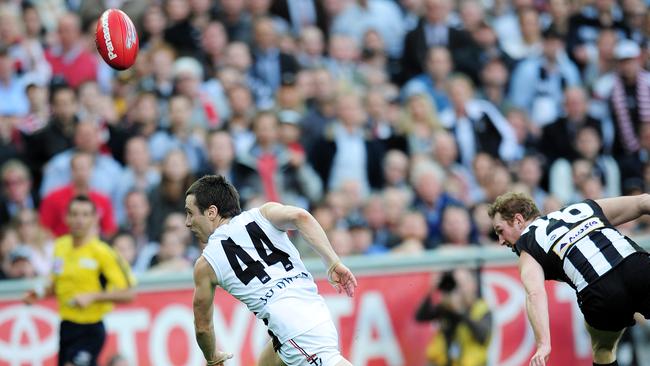
WEAKNESS
If Ross Lyon had his time over he would’ve done things differently in the moments after the drawn Grand Final, where flooded changerooms and immediate uncertainty over how to handle the week contributed to the Saints running out of gas. Just as Goddard’s high-flying mark typified the Grand Final draw, Heath Shaw smother as Nick Riewoldt ran into an open goal typified the replay as the Saints lost by 56 points. St Kilda had a bottom few of Zac Dawson, Andrew McQualter, Brett Peake, Robert Eddy and Jason Blake and yet somehow they won 39 games in two seasons. Still, there was no premiership.
ADELAIDE 2017 (22)
Coach: Don Pyke
Captain: Taylor Walker
Won: 17. Lost: 7. Drew: 1.
Sat atop the ladder on percentage after home-and-away season. Lost Grand Final to Richmond by eight goals.
KEY STATS
Ranked No. 1 for points scored, goal per inside 50 and No. 2 for score per inside 50.
Ranked No. 1 for points scored from turnovers and points differential from turnovers.
Ranked No. 3 for turnovers created in the forward half and No. 1 for points scored from these turnovers.
STRENGTH
The AFL’s No. 1 offensive team — and one of the more potent attacks in recent times. After Round 6 the Crows were 6-0 with scores of 147, 113, 100, 153, 153 and 140 and premiership favourites. Once known as the dour “CrowBots”, a forward line boasting Taylor Walker, Josh Jenkins, Eddie Betts and Tom Lynch left defenders in cold sweats and their slick ball movement looked unstoppable at times. The Crows were so dominant they had eight players make the All-Australian squad of 40 – Betts, Matt Crouch, Sam Jacobs, Rory Laird, Jake Lever, Lynch, Rory Sloane and Walker. Pummelled GWS and Geelong at home to reach their third Grand Final.
WEAKNESS
It appeared they had few weaknesses until the yips arrived at quarter-time on Grand Final day. The Crows led by 13 points and then conceded 14 of the final 18 goals and that triggered the imploding of a club. Walker led Adelaide’s power stance during the national anthem in the finals and that became a mockery. Then Jake Lever walked out on the club amid reports he was uninvited from the best-and-fairest. Walker took aim at him publicly and then Adelaide embarked on that infamous pre-season camp which helped derail the next two seasons.
MARK ROBINSON’S VERDICT
Saints easy. The 2009-10 St Kilda was desperately unlucky not to win consecutive flags. It boasted an abundance of top-end performers — Nick Riewoldt, Lenny Hayes, Brendon Goddard, Stephen Milne, Leigh Montagna, Sam Fisher and Nick Dal Santo — and a host of devoted role players. The club was coached superbly by Ross Lyon. The Crows smashed GWS and Geelong at Adelaide Oval in their first two finals in 2017 and were then trounced by Richmond in the Grand Final. The Saints in 2010 were a machine and do not get the accolades they deserve despite not winning the flag.
MATCH 4: HAWTHORN 2011 V SYDNEY 2016
HAWTHORN 2011 (15)
Coach: Alastair Clarkson
Captain: Luke Hodge
Won: 19 Lost: 6
Was third before finals. Lost preliminary final to Collingwood by just three points.
KEY STATS
Ranked No. 3 for points against, points against from stoppages and points against from turnovers.
Ranked No. 3 for points scored and points from turnovers.
Ranked No. 1 for disposal differential, uncontested possession differential and disposal efficiency differential.
STRENGTH
After two seasons in the wilderness the Hawks, finally, re-emerged as a premiership threat. They had not won a final since that shock 2008 flag and yet they looked like a top-four team all season long. Sam Mitchell won the third of his five best-and-fairests and Lance Franklin booted 82 goals, which remains his second-best return behind the century in 2008. Franklin was consistent, kicking at least two goals in 20 out of 22 games while defenders Grant Birchall and Josh Gibson also made the All-Australian squad of 40.
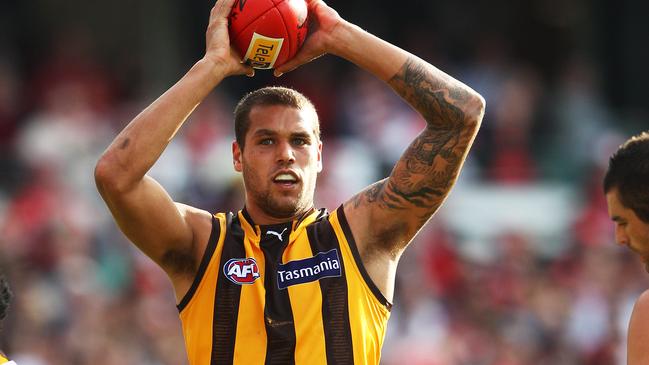
WEAKNESS
Jarryd Roughead was reborn as a ruckman-forward in 2011 although in Round 12 he ruptured his Achilles against Geelong and was carried from the field on a stretcher, his season finished. Still, Hawthorn stayed on the premiership course and always looked like beating Collingwood in the 2011 preliminary final. Franklin’s ridiculous banana goal to reclaim the lead in time-on looked set to secure the victory, but Luke Ball — not notably a goalkicker or long kicker — somehow snapped a 35m left-foot goal to end Hawthorn’s season.
SYDNEY 2016 (18)
Coach: John Longmire
Captains: Kieren Jack & Jarrad McVeigh
Won: 19 Lost: 7
Was minor premier on percentage, but lost Grand Final to Western Bulldogs by 22 points.
KEY STATS
Ranked No. 1 for points against, opposition score per inside 50 and points against from stoppages.
Ranked No. 4 for points scored, No. 2 for points scored from stoppages and points differential from stoppages.
Ranked No. 3 for contested possession differential and No. 4 for disposal differential.
STRENGTH
This was Sydney’s most dominant home-and-away season in a century. The minor premier lost just five games, and four of those were by 10 points or less, and seven wins were by 10 goals or more. The Swans delivered five All-Australians — Dane Rampe, Dan Hannebery, Josh Kennedy, Lance Franklin and Luke Parker, who finished runner-up in the Brownlow Medal. In Round 9 they defeated Hawthorn, winner of the past three premierships, at the MCG and in Round 16 they smacked Geelong by 38 points under the Friday night lights at GMHBA Stadium in Kieren Jack’s 200th game. They never lost consecutive games and entered the finals on the back of 113-point win against Richmond in which Franklin slotted 7.4.
WEAKNESS
Sydney only really stuttered in September. The AFL introduced the pre-finals bye and denied the Swans a home qualifying final by instead fixturing their clash against Greater Western Sydney at ANZ Stadium, which would be the last Australian rules game at the venue. A shock loss put Sydney on the long road to the Grand Final, but comfortable wins against Adelaide and Geelong restored premiership favouritism. The Swans led by 25 and 37 points at quarter-time respectively in those finals, although they lost defender Aliir Aliir (knee) in the preliminary final. But the Western Bulldogs had been their bogy team — coach Luke Beveridge won his first four games against Sydney — and the Grand Final script played out in fairytale fashion for the Dogs. Franklin injured his ankle in the first quarter and Hannebery suffered a nasty knee injury in the last quarter, however both battled on bravely. Coach John Longmire fumed at the 20-8 free kick count and the next day Tom Mitchell asked for a trade to Hawthorn.
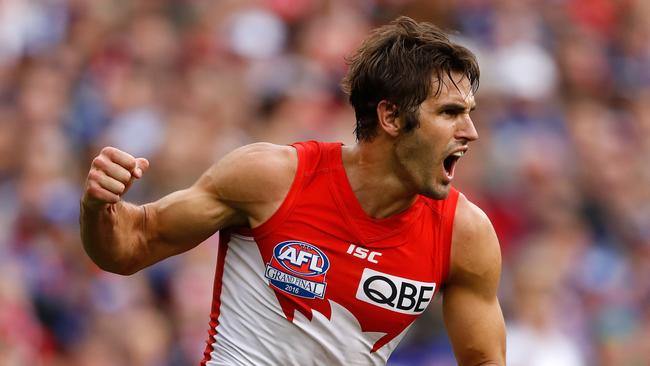
MARK ROBINSON’S VERDICT
The Hawks win this one. What a brilliant 2016 from the Swans. Finished the home-and-away rounds on top of the ladder with a percentage of 151.2. They then lost their first final to the Giants, but still fought their way into the Grand Final, where they were on the wrong side of the Cinderella story. The Hawks, meanwhile, played off in a classic preliminary final against Collingwood. Franklin kicked the inside-out dribble goal to put the Hawks in front before Luke Ball snapped the winner for the Pies. Collingwood could have beaten the Cats the next week, too. Am a bit in love with the 2011 preliminary final game, so it’s Hawks for me.
MATCH 5: GEELONG 2011 V WESTERN BULLDOGS 2010
GEELONG 2011 (3)
Coach: Chris Scott
Captain: Cameron Ling
Won: 22 Lost: 3
Premiers
KEY STATS
Ranked No. 1 for points scored, points from turnovers and goals per inside 50.
Ranked No. 2 for points against, No. 1 points against from stoppages and No. 3 for conceding a score from an opposition inside 50.
Ranked No. 3 for both contested and uncontested possession differential and No. 1 for inside 50 differential.
STRENGTH
How can a team lose its best player (Gary Ablett) and a two-time premiership coach (Mark Thompson) yet still win the next flag on offer? Geelong did all that — and more — in a remarkable 2011 season. Freshened up by first-time coach Chris Scott (who won his first 13 games in charge), the club retained the bulk of its 2007 and 2009 premiership-winning line-ups, including Joel Selwood, Jimmy Bartel, Steve Johnson, Corey Enright, Cameron Ling, Matthew Scarlett and Joel Corey, to name a few. The Cats didn’t just beat teams — they torched them. In consecutive weeks, they accounted for Melbourne (186 points) and Gold Coast (150) by a collective 56 goals — the highest-ever in successive games in VFL/AFL history. They won each of their finals by five goals or more and were the only team to beat a red-hot Collingwood all season.
WEAKNESS
Hard to pinpoint weaknesses or low points, except the end of the club’s record streak of wins down the highway. The Cats’ 29-game streak at Kardinia Park came to an end in Round 20 when the Swans produced a stunning 13-point upset. All three of Geelong’s losses came by 13 points or less. The loss of Daniel Menzel — to his first knee injury — hurt the club in the first final. The Cats trailed the Magpies in the Grand Final by three goals early in the second term and lost James Podsiadly during the course of the game, but 23-year-old Tom Hawkins came of age and Scott’s team pulled away in style in the final term.
WESTERN BULLDOGS 2010 (30)
Coach: Rodney Eade
Captain: Brad Johnson
Won: 15 Lost: 10
Finished fourth on home-and-away ladder and lost preliminary final to St Kilda by four goals.
KEY STATS
Ranked No. 5 for point scored and points from turnovers.
Ranked No. 1 for clearance differential and No. 2 for points from stoppages differential.
Ranked No. 4 for contested possession differential and disposal differential.
STRENGTH
Boosted by recruit Barry Hall (who kicked 80 goals for the season), the Western Bulldogs were a potent force in 2010. Ryan Griffen elevated his game to win his first best and fairest, Matthew Boyd polled 20 Brownlow votes and Brian Lake was All-Australian fullback. A clutch of five consecutive wins from Rounds 15-19 (by an average of 53 points) gave hope of the club ending a long Grand Final drought. That looked almost within reach when the Dogs led the Saints by a goal at halftime of the preliminary final.
WEAKNESS
Preliminary-it is struck the Bulldogs for a third consecutive year. Just when they looked ready to advance to their first premiership playoff since 1961, the Saints stopped them in their tracks with a seven-goal third term. In six attempts to knock off the top-three sides in 2010 (Collingwood, St Kilda and Geelong) the Bulldogs couldn’t manage one win, which showed they lacked the killer punch required. The sacking of Jason Akermanis late in the season created waves internally and put an external focus on the club. A fit and firing “Aker” might have made the difference if things had been different, but it wasn’t to be.
MICK McGUANE’S VERDICT
Geelong. This contest would come down to the Bulldogs’ defence up against Geelong’s attack. Geelong had plenty of avenues to score with James Podsiadly, Paul Chapman, Tom Hawkins and Steve Johnson lurking. There are plenty of questions here. Would Ryan Hargraves go to Johnson? Does Tom Williams or Dale Morris go up against Podsiadly? Or is Morris undersized and is he better off playing on Stevie J or Paul Chapman? And don’t forget Trent West, as he started on the ground as another tall in the 2011 Grand Final. Where does that leave a 21-year-old Easton Wood? Brian Lake would certainly go to Hawkins. The strength of the Cats in their premiership year was their scores from stoppages and they were elite at punishing turnovers. Their pressure was underrated as well, so the Cats win this in a thriller.
MATCH 6: RICHMOND 2017 V GEELONG 2010
RICHMOND, 2017 (6)
Coach: Damien Hardwick
Captain: Trent Cotchin
Won: 18 Lost: 7
Premiers
KEY STATS
Ranked No. 1 for points against, points against from turnovers and for conceding a score from an opposition inside 50.
Ranked No. 2 for time in forward half, No. 1 for forward half turnovers created and No. 3 for points scored from these turnovers.
Ranked No. 4 for pressure applied and for pressure applied in the forward half.
STRENGTH
Invention is the mother of necessity and that sums up Richmond’s extraordinary 2017 drought-breaking premiership. Everyone at the club was under siege heading into the season, especially coach Damien Hardwick and skipper Trent Cotchin. They ended it as the competition’s benchmark. The Tigers unveiled a unique forward line build on pressure, with one tall in Jack Riewoldt surrounded by a swarm of smaller players. The arrival of Dion Prestia, Toby Nankervis and Josh Caddy made a huge difference, and Dustin Martin transformed himself into the best player in the game. He also attracted multimillion-dollar offers from rival clubs before he opted to stay. A refined game plan, a harder mental edge and a care and belief in each other made the Tigers compelling viewing.
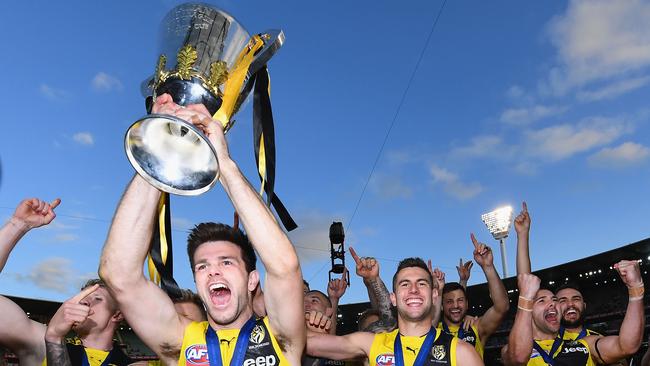
WEAKNESS
Hard to believe a string of heartbreaking close losses — three by less than a goal in consecutive weeks from Rounds 7-9 — cast more doubt on the Tigers’ toughness. The most vulnerable Richmond looked all season came in Round 16 when St Kilda put on a clinic — the Saints led 14.8 (92) to 1.4 (10) at halftime. The final margin was 67 points and the doubters had more ammunition. Adelaide went into the Grand Final as favourite, but not even the Crows’ “Power Stance’ could save them from a rampant Richmond which was intent on winning its first flag in 37 years.
MORE AFL NEWS:
AFL greatest team of the decade: You decide the best team since 2010
The Tackle: We miss so much about footy but what we miss most is connection to each other
GEELONG, 2010 (27)
Coach: Mark Thompson
Captain: Cameron Ling
Won: 18 Lost: 7
Sat second on the home-and-away ladder but lost preliminary final to Collingwood by 41 points.
KEY STATS
Ranked No. 1 for points scored, score per inside 50 and goal per inside 50.
Ranked No. 2 for points differential from turnovers and No. 1 for points differential from stoppages.
Ranked No. 1 disposal differential, uncontested possession differential and No. 2 for contested possession differential.
STRENGTH
The reigning premiers had their usual array of superstars still available, even if the side didn’t look as cohesive as previous years. Locked into the top two from Round 7 until the end of the home-and-away season, Geelong’s dominance meant it had six All-Australians with Gary Ablett (756 disposals), Steve Johnson (63 goals), Joel Selwood (best and fairest), Corey Enright, Harry Taylor and Paul Chapman all getting the nod. At their relentless best, these Cats buried teams. Seven home-and-away wins were by 10 goals or more — with their 108-point win over Richmond and 101-point demolition of the Bulldogs the most brutal.
WEAKNESS
A schism between Ablett and Mark Thompson created unwanted tension. Ablett was mulling over a multi-million offer from Gold Coast; Thompson was trying to ensure the Cats’ salary cap didn’t blow up. Thompson feared the Cats were getting stale with his voice after so many years in the role. He left at the end of the season, as did Ablett. Geelong knocked off Collingwood in Round 9, but couldn’t get close to the Magpies when it mattered. The Cats almost knocked off the Saints in the qualifying final but heartbreakingly missed out in the dying moments of the game, a lethal blow to their flag hopes.
MICK McGUANE’S VERDICT
Geelong. Another controversial one, but I’m going with the Cats here. In the 2017 finals series, no team could stand up to Richmond’s heat. The 2010 Cats were probably the best team in it that year and Collingwood’s pressure denied them from getting into the Grand Final. This is where the contradiction might be because if Geelong succumbed to Collingwood’s pressure, why wouldn’t it succumb to Richmond’s? That’s a fair argument, but they had the personnel to trouble the Tigers. Geelong’s ability to score, from both stoppages and intercepts, would really challenge the Tigers structurally. As good as that Richmond backline was, including their general Alex Rance, I’ve got no doubt it would be vertically challenged here. Who tags Dustin Martin? Cameron Ling in midfield and then Matthew Scarlett when he pushes forward.
MATCH 7: HAWTHORN 2013 V COLLINGWOOD 2019
HAWTHORN, 2013 (10)
Coach: Alastair Clarkson
Captain: Luke Hodge
Won: 22 Lost: 3
Premiers
KEY STATS
Ranked No. 1 for points scored and points from stoppages, and No. 2 for goals per inside 50.
Ranked No. 3 for points scored from turnovers and No. 2 for points differential from turnovers.
Ranked No. 2 for disposal differential, uncontested possession differential and inside 50 differential.
STRENGTH
The pain of the previous year’s Grand Final loss, the recruitment of a key defender and the blending of one-time premiership heroes with a group of younger players made the 2013 Hawks a powerful force. Brian Lake won the Norm Smith Medal and also released the shackles on best-and-fairest winner Josh Gibson. Jarryd Roughead won the Coleman Medal, Sam Mitchell was unstoppable and the leadership of Luke Hodge and Alastair Clarkson was invaluable. Clarkson anticipated the impending departure of Lance Franklin at season’s end by making the club less reliant on him as an avenue to goal. After losing to Geelong (again) in Round 1, the Hawks reeled off 12 consecutive wins (equal to the club record in 1961) before the Cats struck again in Round 15.
WEAKNESS
The spectre of Geelong hung over Hawthorn in the years after the 2008 premiership, thanks to the “Kennett Curse”. Break it and the Hawks might unlock the chains that bound them. A seven-point loss and a 10-point loss to their nemesis in the 2011 regular season only added to the pain. Then a loss to Richmond by 41 points in Round 19 made the Hawks look vulnerable. As it turned out, those would be the only losses the Hawks had in a season that started the flag three-peat. A nail-bitter ensued in the preliminary final. A late miss from Geelong’s Travis Varcoe helped send the Hawks into the Grand Final and ultimately a trophy-clinching win over Fremantle.
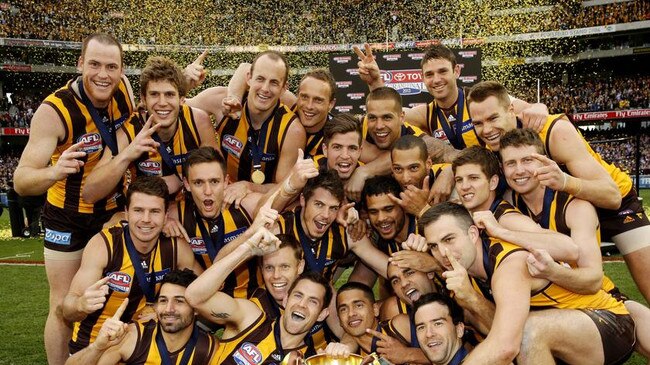
COLLINGWOOD, 2019 (23)
Coach: Nathan Buckley
Captain: Scott Pendlebury
Won: 16 Lost: 8
Placed fourth after home-and-away rounds and lost preliminary final to the Giants by four points.
KEY STATS
Ranked No. 2 for points against and No. 3 for conceding a score from an opposition inside 50.
Ranked No. 4 for points differential from both turnovers and stoppages.
Ranked No. 1 for disposal differential, No. 4 for contested possession differential and No. 2 for uncontested possession differential.
STRENGTH
Collingwood loomed as Richmond’s greatest threat, knocking off the Tigers by 44 points in Round 2 before streaking to a 10-3 start to the season. Jordan Roughead proved a bargain pick-up from the Dogs while Dayne Beams faced challenges in his return. Brodie Grundy elevated his game to a new level, the midfield shone, while Darcy Moore and Jamie Elliott slowly but surely managed to overcome injury issues. In an even season, the Magpies strode into the finals off the back of four successive wins, then touched up minors premiers Geelong in a hard-fought qualifying final to push into a preliminary final.
WEAKNESS
A great season was ruined by some unsettling injuries and off-field issues as well as a half-hour lapse which cost them dearly. Young gun Jaidyn Stephenson copped a 10-match suspension for a gambling indiscretion and Beams’ season ended prematurely due to injury and mental health issues. Other injuries to Mason Cox, Jordan De Goey, Adam Treloar, Taylor Adams and Tom Langdon impacted at different times. The team failed to adapt to the rain in the preliminary final against an undermanned GWS. The Pies also failed to capitalise on Grundy’s ruck dominance as the Giants kicked 5.2 to 0.3 in the third term. The Magpies stormed home but fell four points short, leaving them to lament a wasted opportunity.
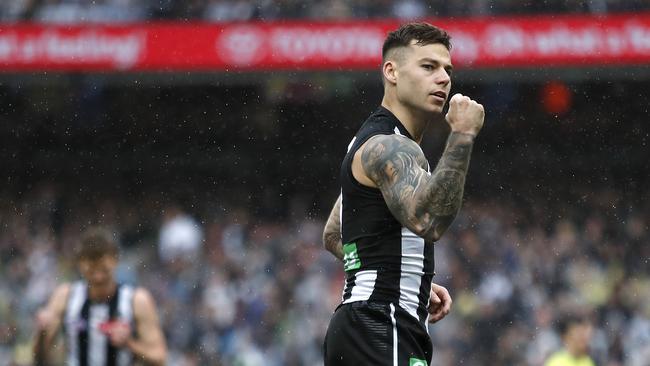
MARK ROBINSON’S VERDICT
It was the first of Hawthorn’s three-peat versus the Pies who were denied by the Giants in a preliminary final slugfest. Have chosen the Hawks. Was the last year of Lance Franklin at Hawthorn and the start of a dynasty. They finished the home-and-away season on top with an imposing 19-3 record and then won the prelim by five points (Geelong) and the GF by 15 points (Fremantle). The Pies gave up a huge lead and almost stole it at the end. That loss still hurts the Pies’ organisation. Simply, the Hawks got it done and the Pies didn’t.
MATCH 8: GWS 2016 V PORT ADELAIDE 2014
GREATER WESTERN SYDNEY, 2016 (14)
Coach: Leon Cameron
Captain: Phil Davis, Callan Ward
Won: 17 Lost: 7
Was fourth on home-and-away ladder then lost epic preliminary final to the Western Bulldogs in Sydney by a goal.
KEY STATS
Ranked No. 2 for points scored and No. 3 for generating a score once inside 50.
Ranked No. 2 for clearance differential and No. 1 for points scored from stoppages.
Ranked No. 4 for contested and uncontested possession differential.
STRENGTH
All the hard work in drafting some of the best kids in the land and retaining most of them paid off with the club’s first finals appearance and its most wins in a season (17). Leon Cameron turned the “Orange Tsunami” into a contested beast with a harder edge in 2016. Steve Johnson (43 goals) was a strong acquisition. Toby Greene, Stephen Coniglio, Josh Kelly, Tom Scully, Heath Shaw and Zac Williams were outstanding. Phil Davis and Callan Ward led from the front. Six straight wins came from Rounds 4-9, including an 83-point thumping of reigning premier Hawthorn. But their most telling performance was a six-goal qualifying final crunching of minor premier Sydney.
WEAKNESS
Steve Johnson’s outstanding first season with the Giants hit a massive hurdle when he was suspended for a match after he collected Swan Josh Kennedy high in the first final. It cost him a spot in the preliminary final against the Western Bulldogs, who were shaping as the AFL’s fairytale team. The Giants sorely missed Stevie J’s presence, uncanny goal sense and finals experience. The two young sides slugged it out over four quarters — the Giants’ last three shots at goal were behinds as the Bulldogs held on to win by six points. The Giants lamented what might have been a week later when the Bulldogs won the flag.
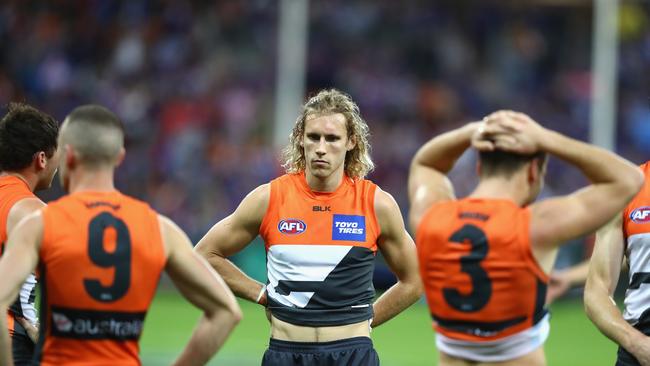
PORT ADELAIDE, 2014 (19)
Coach: Ken Hinkley
Captain: Travis Boak
Won: 16 Lost: 9
Placed fifth after home-and-away rounds. Two huge finals wins against Richmond and Fremantle preceded a three-point preliminary final loss to Hawthorn.
KEY STATS
Ranked No. 1 for inside 50 differential and time in forward half differential
Ranked No. 2 for points scored, points from stoppages and No. 4 for points scored from turnovers
Ranked No. 4 for disposal and contested possession differentials
STRENGTH
Ken Hinkley’s second season at the helm delivered in spades as he brought together a group capable of beating the best. Port Adelaide stormed to the top of the ladder by Round 6 after it beat Geelong — a position it maintained for a large part of the season, courtesy of eight straight wins. Power players won mark of the year (Chad Wingard) and goal of the year (Matt White). Big finals wins over Richmond and Fremantle (at Subiaco) put the club into a preliminary final with Hawthorn that went down to the wire.

WEAKNESS
The Power lost six of their last nine games of the home-and-away season which blew any hopes of a double chance. The heartbreaking nature of the three-point preliminary final loss cut deep. Inaccuracy cost the Power heavily in that MCG clash — they kicked 13.16 (94) to the Hawks’ 15.7 (97). A wasteful first quarter yielded 3.9 and left the door ajar for the more efficient Hawks and the Power have never been as deep in the finals since.
MARK ROBINSON’S VERDICT
What a match-up this is. People reckon the 2016 preliminary final between the Giants and the Dogs was one of the best games of the past 50 years and Port Adelaide’s loss to Hawthorn in 2014 at the MCG was also a nailbiter. The Hawks’ team that year is the No. 1 seed in this competition and Port kicked 5.3 to 2.1 in the final quarter to almost pinch a Grand Final berth. It was super effort, Still, the Giants of ’16 were something else, although they are still ruing giving up a home preliminary final. This is tight, but slightly favour the Giants.
Originally published as AFL greatest team of the decade: You decide the best team since 2010

